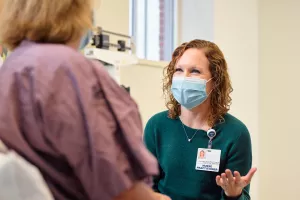Welcoming home a baby is one of life’s most precious moments — one made possible with fertility care for people who struggle to conceive naturally. Together with our partners at Boston IVF, we fulfill family-building dreams with treatments like in vitro fertilization (IVF), donor egg, LGBTQAI+ fertility and egg freezing.
Caring for you on your path to parenthood
Deciding to grow your family is a heartwarming milestone. Yet, some paths to parenthood have more detours than others because of conditions that affect reproductive health like PCOS, endometriosis and male-factor infertility. The truth is that 1 in 6 people face infertility — and you're not alone.
Advancements in reproductive medicine have given many individuals and couples the chance to bring home a bundle of joy. And should you desire to grow your family later in life, egg freezing allows you to preserve healthy eggs now for future use.
It's important to know that time and age are among the most important factors that affect fertility. Don’t delay in seeking fertility care if you’ve been trying to conceive naturally without the results you’ve hoped for. And should you need help with your family-building goals, you can trust that our doctors and the team at Boston IVF will blend hope and healthcare at every step of the journey.

Conditions
Infertility affects men and women equally. That’s why it’s so important to be in tune with your health, as well as your partner’s.
The following conditions can cause infertility in women and assigned females at birth (AFABs):
- Advanced maternal age
- Diminished ovarian reserve
- Endometriosis
- Fallopian tube blockage or damage
- Genetic abnormalities in an embryo
- Hormonal imbalances
- Miscarriage
- Polycystic ovarian syndrome (PCOS)
- Previous pelvic infection or inflammation
- Sexually transmitted diseases
- Stress
- Structural abnormalities of the uterus, fallopian tubes or ovaries
Common causes of infertility affecting men and assigned males at birth (AMABs) include:
- Abnormally shaped sperm (poor morphology)
- Decreased sperm movement (poor motility)
- Diabetes
- High blood pressure
- Hormonal abnormalities
- Low sperm count
- Past injury to testicles
- Previous infections
- Varicocele
- Sexually transmitted diseases
- Stress
Testing
While each person’s fertility treatment plan is unique, everyone starts with an initial fertility consultation and testing. We provide testing for all involved partners so we can understand the cause of infertility and how to navigate it. Your doctor may order more tests based on any preexisting conditions, your reproductive history and lifestyle.
Common tests we turn to for diagnosing female-factor infertility include:
- Blood testing
- Hysterosalpingogram (HSG)
- Sonohystogram
- Ultrasound
- X-ray
Men and AMABs can expect to receive a semen analysis. Testing the sperm is very important because it gathers important information about the sperm’s quantity, shape and movement, among other factors.
Treatments
On hopeful days and challenging ones, your fertility care team will be by your side. You can trust we’ll put your goals first, whether you’re taking your first steps with fertility treatment, seeking a second opinion, pursuing treatment for another child or interested in switching to us from a different clinic.
Our specialists are skilled in surgeries that can help alleviate symptoms from conditions affecting your reproductive health. We also encourage you to talk with your doctor about how reproductive surgeries like tubal reversal can play into your family-building goals.
Fertility treatments are broken down into 3 main categories: low-tech, high-tech and third-party reproduction.
Low-tech fertility treatment
Low-tech fertility treatment involves treatment that only takes place within your body, meaning fertilization doesn’t take place in one of our labs. Nearly half of all fertility treatments involve a low-tech approach. In order from simple to detailed, low-tech fertility treatments include:
- Timed intercourse: Timed intercourse is the simplest form of treatment and involves aligning intercourse to when the female partner’s ovaries release mature eggs, also known as ovulation.
- Ovulation induction: Ovulation induction is a helpful option for women who may not ovulate on a regular schedule. Your doctor will prescribe an oral medication to further stimulate the ovaries, meaning the body should release more eggs.
- Intrauterine insemination (IUI): IUI involves placing sperm directly into the uterus for fertilization. The sperm can be from a partner or from a sperm bank.
High-tech fertility treatment
High-tech fertility treatments involve fertilization that takes place outside the body in one of our labs before being transferred into the uterus. Individuals and couples have the option to provide their own sperm and eggs to create embryos or use donor specimens.
We offer people the following high-tech treatments:
- Egg freezing
- Family balancing
- Genetic testing of embryos
- Gestational carrier
- IVF
Egg freezing is an excellent way for people to pause the clock on their reproductive health by freezing healthy, younger eggs now for future use. Once you’re ready to grow your family, connect with your doctor to use your frozen eggs with IVF treatment.
IVF has paved the way for many people to grow their families. It involves retrieving eggs from the female partner’s body (or using a donor egg) to fertilize with sperm in the lab. Once an embryo has matured, people have the option to genetically test or screen embryos for hereditary conditions or chromosomal abnormalities.
The healthy embryo is then transferred into the uterus, implants and grows into a baby.
We also support people who decide to use a gestational carrier to grow and deliver a baby. The gestational carrier can be someone you know or select from an agency. What’s important to know is that your carrier is simply carrying the baby and won’t have a biological tie to the child.
Third-party reproduction
Third-party reproduction makes parenthood possible for single mothers by choice, LGBTQAI+ couples and families. The term refers to people who use specimens donated by someone else (a third-party) to grow their family, like:
- Donor egg
- Donor embryo
- Donor sperm
Third-party reproduction is paired with both high-tech and low-tech fertility treatments.

From regular office visits to inpatient stays, find the healthcare you need and deserve close to home.

Meet the doctors and care team devoted to supporting you every step of the way along your path to better health.